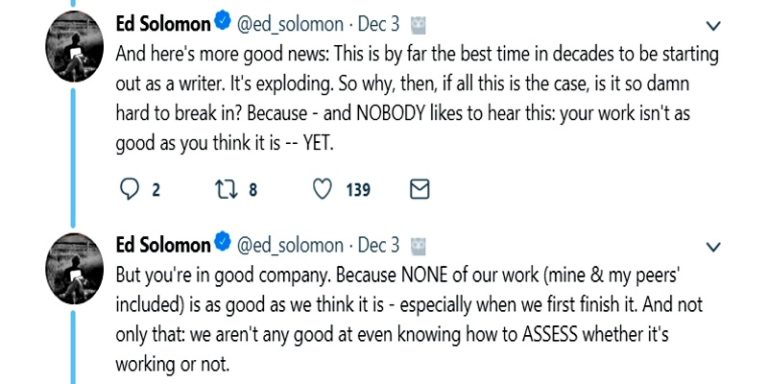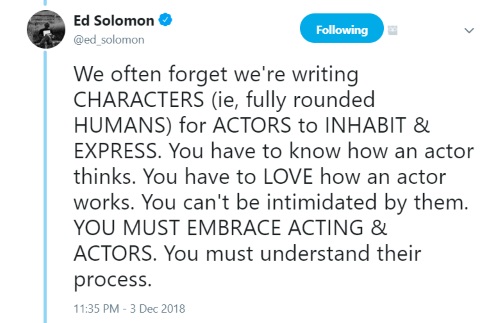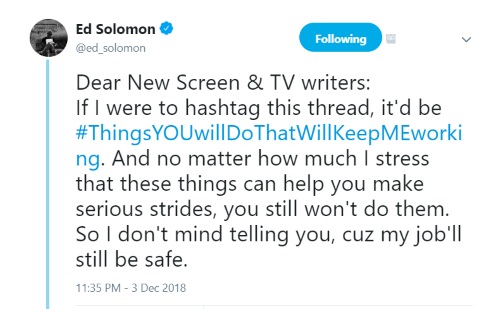Amazing Screenwriting Advice from Ed Solomon's Twitter Feed

Hollywood screenwriter Ed Solomon wrote a long Twitter thread that has lit the screenwriting community on fire in the best of ways with outstanding words of encouragement and tough love advice.
Solomon — known for writing such films as Men in Black, Bill and Ted's Excellent Adventure, and Now You See Me — opened his late-night Twitter thread with an in-your-face opening.
Here we tackle the best screenwriting nuggets of the thread and elaborate on his wise words.
"Everyone who hires writers would rather hire you than me. This is fact. You're cheaper. You're (usually) younger. You have (at least, you'd better have) a fresh voice. YOU are what they YEARN for: a 'discovery they can hitch their wagons to."
This gives screenwriters hope. Yes, it's easy to convince yourself that Hollywood wants nothing to do with you. But nothing could be further from the truth — as long as you are writing great scripts.
Producers, studio executives, managers, and agents are always in need of the next best thing. The established writers have more power and demand bigger salaries. Hollywood insiders would much rather find that new talent to pay less and mold into someone they can collaborate with, knowing full well that if they find someone they can "hitch their wagons to" they'll benefit and get you to the point where you can demand that higher salary and have more say.
"And here's more good news: This is by far the best time in decades to be starting out as a writer. It's exploding. So why, then, if all this is the case, is it so damn hard to break in? Because — and NOBODY likes to hear this — your work isn't as good as you think it is. YET."
There are more platforms for screenwriters than there ever has been — feature theatrical releases, streaming channels, multiple broadcast and cable networks, etc. There has never been as much opportunity for screenwriters as there is right now.
However, you have to earn the right to play on those playing fields. One of the most common issues with screenwriters early on in their screenwriting journey is that they believe their work to be more than it is. Too many screenwriters jump into the fire too soon. They'll push that first or second script, or they'll submit that first draft.
You have to take the time to hone your work. You need feedback. You need to read scripts, good and bad, to learn what works and what doesn't.
Chances are, you're not ready yet. And there's nothing wrong with that. There is no such thing as overnight successes. Most media stories that declare this are referencing writers that have likely been in the game for upwards of a decade before any real success.
"But you're in good company. Because NONE of our work (mine and my peers' included) is as good as we think it is — especially when we first finish it. And not only that. We aren't any good at even knowing how to ASSESS whether it's working or not."
Brilliant and honest words. We're often meant to believe that successful screenwriters have somehow opened their eyes to some invisible truth that allows them to write successful movies.
The truth is that, as the late William Goldman once said, "Nobody knows anything." All that you need to do is focus on telling compelling and engaging stories. There are no secret formulas or moments of epiphany that screenwriters can and should seek out. Sure, there are certainly general guidelines and expectations, but, in the end, you have to find a way to tell the best possible cinematic story that readers, Hollywood, and audiences can enjoy.
Read ScreenCraft's The Differences Between Screenwriting Rules, Guidelines, and Expectations!
And here are the three elements that Ed Solomon believes screenwriters will refuse to do to better their writing.
1. "You will refuse to actually have your script read aloud."
He goes on to explain that the words you conjure in your head sound vastly different from what the words sound like outside of your head.
Dialogue that drags, over-explains, and is unclear will be very evident once those words are spoken aloud. Having actors perform your dialogue is one of the best ways to discover if what you've written and read in your head matches what the true intention is.
2. "You won't actually mount your own scenes."
It's one thing to have a table read and a whole other thing to actually see a scene performed on a stage.
It's intimidating. It truly is. Solomon is right when he says that screenwriters would rather keep their characters and stories in their heads where it's safe.
He suggests that you direct some scenes on stage yourself or act in some scenes with someone else directing. You would likely want to film these scenes, or you could instead produce them on film or video cinematically instead of for the stage. Regardless, there's something to be said for seeing a three-dimensional version of your written scenes — and what you can learn from those moments.
Solomon goes on to say, "Sometimes it's shamefully embarrassing how badly the scenes go when on their feet. But man, do you learn. Often, for me, I learn just how much I overwrite."
3. "You won't take an acting class."
He goes on to say that learning how to be inside of your scenes will transform the way you write.
Screenwriting is more than just conjuring a concept, creating characters to deal with the conflict your concept introduces and putting them through the motions of a plot.
For your writing to truly stand out, you need to get into the shoes of your characters and feel the confines of the conflict within your story.

These are some of the forgotten or ignored elements of screenwriting. The process only starts with the written word. What screenwriters write needs to be performed. And such performances are not merely about reciting the words you've written while directors direct the action you've envisioned. It's more than that.
Screenplays are the beginning of a collaboration between many to make the magic unfold on those screens. And when you write with that in mind, it's so much easier for the script reader to envision your cinematic story because you've done the work and have made the emotions, themes, and moments of the characterization and story believable.
Take Ed Solomon's words to heart. And if you're still too shy to do so full swing, start simply by performing your dialogue aloud to yourself. Get into your characters. Don't just hit beats for the character and story arcs. Put yourself through what they are going through. It'll make you a better writer.
And then once you see that it works, go the distance and take Solomon's advice.
Follow Ed Solomon on Twitter because he stated that this is just Volume 1! Hopefully, more to come...
Ken Miyamoto has worked in the film industry for nearly two decades, most notably as a studio liaison for Sony Studios and then as a script reader and story analyst for Sony Pictures.
He has many studio meetings under his belt as a produced screenwriter, meeting with the likes of Sony, Dreamworks, Universal, Disney, Warner Brothers, as well as many production and management companies. He has had a previous development deal with Lionsgate, as well as multiple writing assignments, including the produced miniseries Blackout, starring Anne Heche, Sean Patrick Flanery, Billy Zane, James Brolin, Haylie Duff, Brian Bloom, Eric La Salle, and Bruce Boxleitner. Follow Ken on Twitter @KenMovies
For all the latest ScreenCraft news and updates, follow us on Twitter, Facebook, and Instagram.
Tags
Get Our Screenwriting Newsletter!
Get weekly writing inspiration delivered to your inbox - including industry news, popular articles, and more!




























